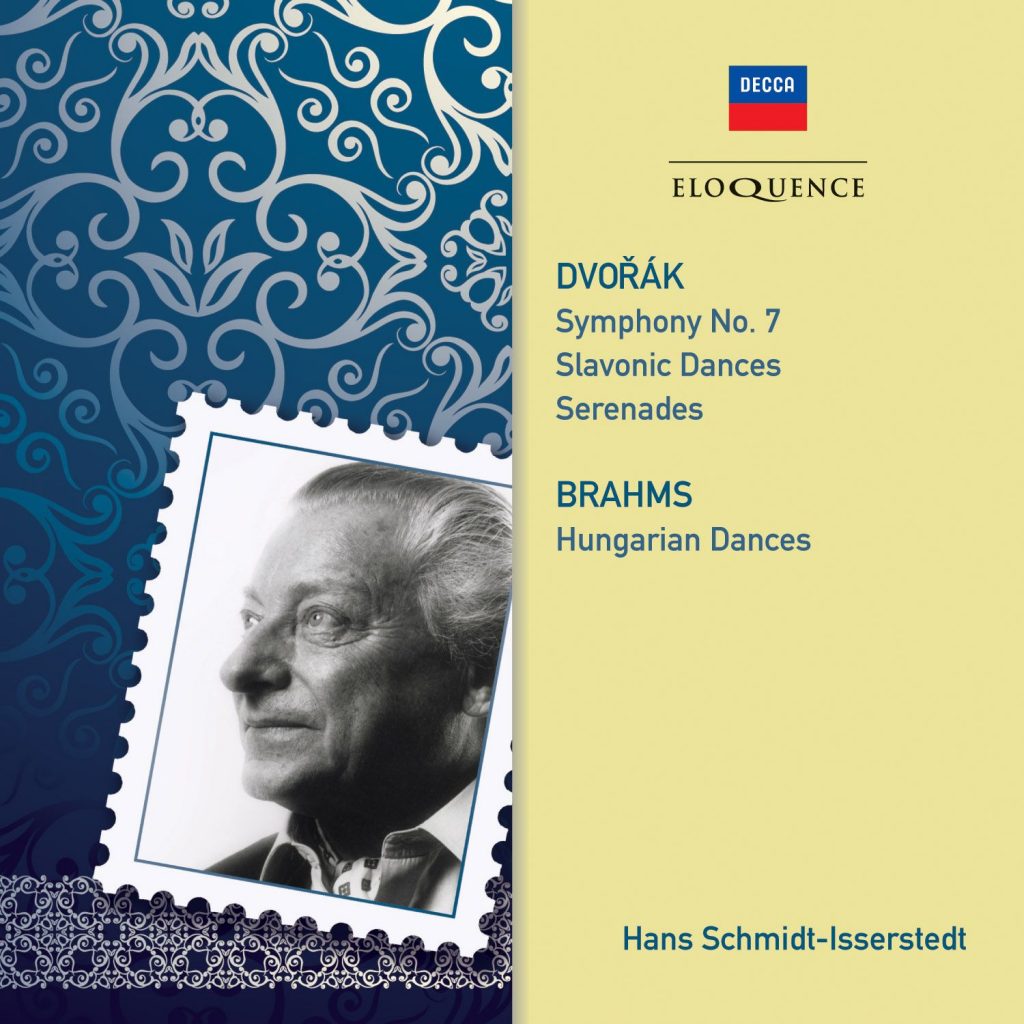Newly remastered, and new to CD, the dramatically charged Dvořák recordings made by Hans-Schmidt-Isserstedt for Decca and Deutsche Grammophon, coupled with the composer’s (and Brahms) folkloric dances.
Eloquence pays tribute to the self-effacing art of Hans Schmidt-Isserstedt (1900-1973) combining three LPs onto a 2-CD set – all recorded during his postwar reinvention as a symphonic conductor of subtle and collegial gifts who brought the best out of orchestras across Europe. In 1945 he was selected by British occupying forces in northern Germany to found and lead the Hamburg Radio Symphony Orchestra (later the NDR Sinfonieorchester) as a German counterpart to the BBC Symphony Orchestra in London. The orchestra’s program of repertoire classics leavened by new music became a model for radio orchestras established across postwar Germany, and Schmidt-Isserstedt enjoyed an Indian summer as a symphonic conductor after beginning his career in operatic posts in Darmstadt, Hamburg and Berlin.
Schmidt-Isserstedt and the NDRSO undertook the first postwar tour of the UK by a German orchestra in politically sensitive conditions during 1951. The Dvořák symphony sessions duly took place at Kingsway Hall in London, during the orchestra’s second tour in the spring of 1953. Supervised by John Culshaw, the sessions included the Seventh Symphony and a selection of four Slavonic Dances. The dances were first issued on a separate LP, coupled with seven Hungarian Dances of Brahms, and then the Slavonic Dances separately released on a 10-inch medium-play (MP) disc.
A decade later, Schmidt-Isserstedt and the NDRSO recorded the two Serenades, for ensembles of wind and strings, which count among Dvorak’s freshest inspirations. Here again, both playing and conducting were praised for their energy, their joyful spirit and sensitivity to the Czech idiom, and yet these performances have been unavailable for many years: their first international release on CD will bring the conductor’s name to a new generation of music-lovers.
CD 1
ANTONIN DVOŘÁK (1841–1904)
1–4 Symphony No. 7 in D minor, Op. 70 (B.141)
5–8 Four Slavonic Dances, Op. 46 (B.83)
JOHANNES BRAHMS (1833–1897)
9–15 Seven Hungarian Dances
Hamburg Radio Symphony Orchestra
CD 2
ANTONIN DVOŘÁK (1841–1904)
1–5 Serenade for Strings in E major, Op. 22 (B.52)
6–9 Serenade for Winds in D minor, Op. 44 (B.77)
NDR-Sinfonieorchester
Hans Schmidt-Isserstedt
Executive Producers: Helmut Najda, Rolf Peter Schröder (Dvořák: Serenades)
Recording Producers: John Culshaw (Dvořák: Symphony, Slavonic Dances; Brahms); Hans Weber (Dvořák: Serenades)
Recording Locations: Kingsway Hall, London, UK, 23–25 March 1953 (Dvořák: Symphony, Slavonic Dances; Brahms); Grosser Saal, Musikhalle, Hamburg, Germany, December 1963
Original Decca Releases: LXT 2807 (Dvořák: Symphony No. 7): July 1953; LXT 2814 (Dvořák: Slavonic Dances, Brahms: Hungarian Dances): September 1953
Original Deutsche Grammophon Release: 136 481 (Dvořák: Serenades)
“Schmidt-Isserstedt seems to have a way with Dvořák; his warm, broad and thoroughly idiomatic treatment … plus Decca’s full-bodied reproduction, make this by far the preferred version of the work.” High Fidelity, January 1954 (Symphony No. 7)
“The Decca recording is outstandingly well managed.” The Record Guide, 1955 (Slavonic Dances)
“The playing in both works is everywhere first-rate, with a delightful buoyancy to the wind playing in Op.44 … a most attractive record, one I shall play late at night when I want to be beguiled.” Gramophone, October 1965 (Serenades)
“Schmidt-Isserstedt is an ideal, understanding interpreter of the [String Serenade]. This is a relaxed and mellow performance, just as it should be.” Gramophone, June 1968

